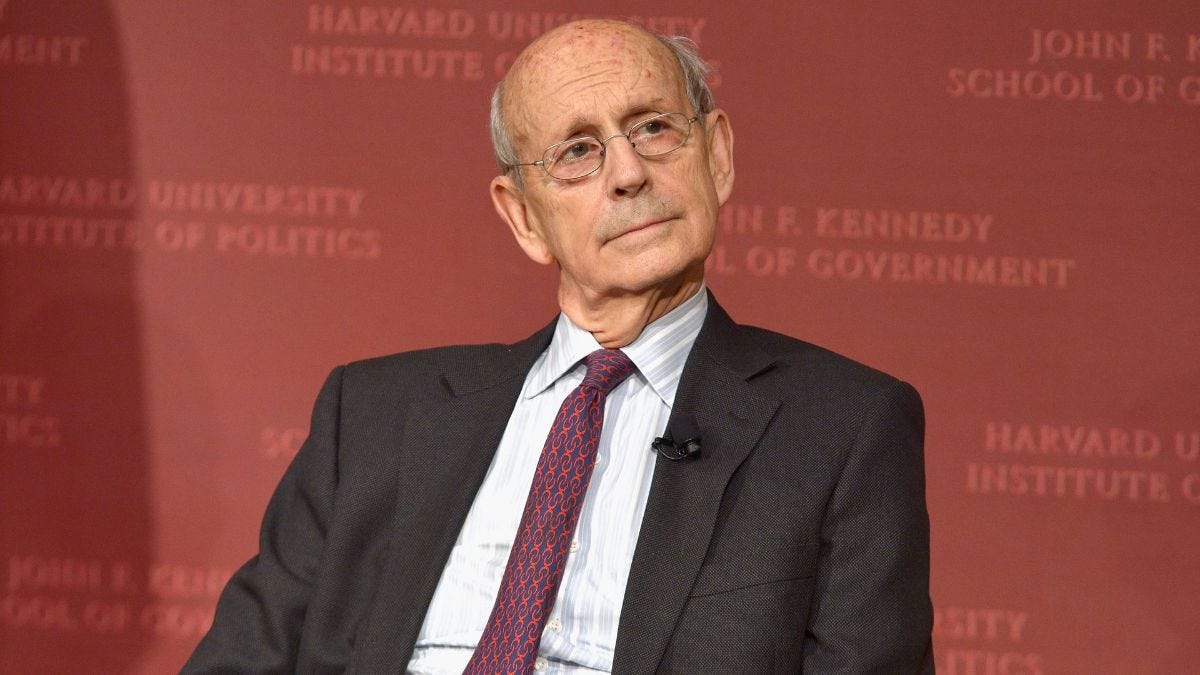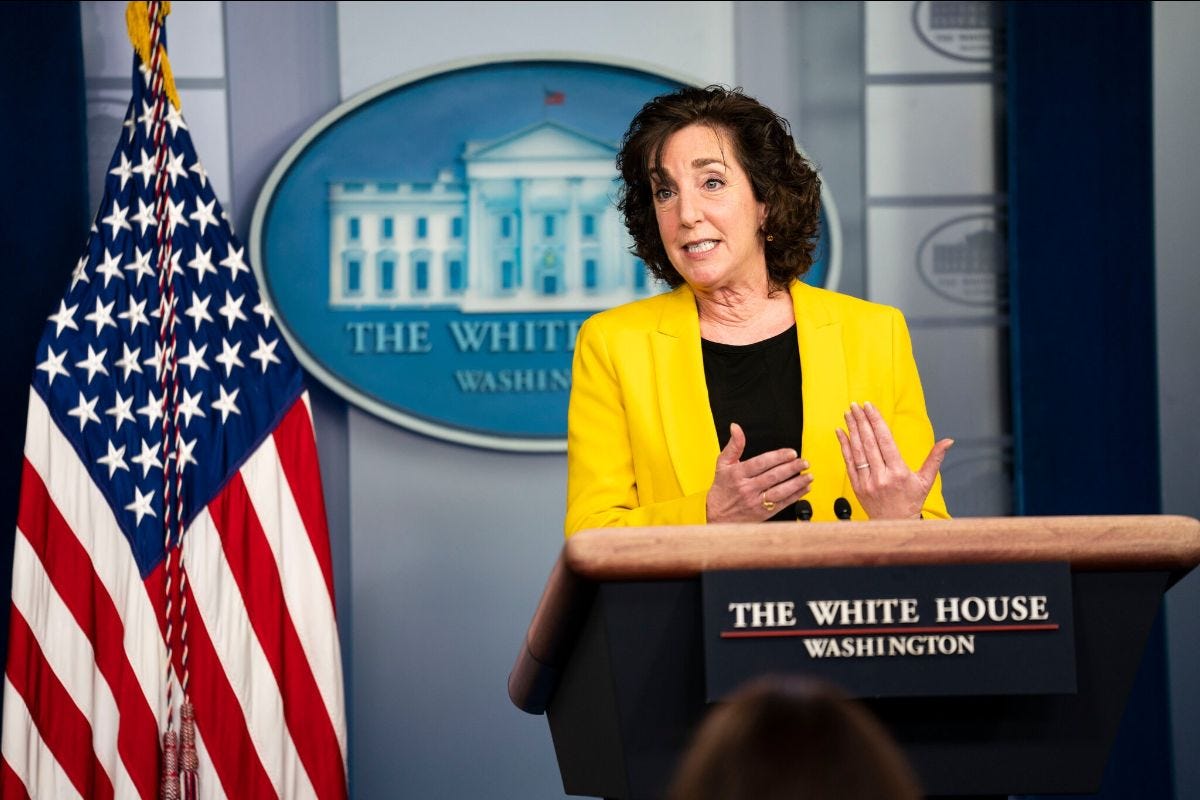Wake Up To Politics - April 12, 2021
Ten years of Waking Up To Politics
Good morning! It’s Monday, April 12, 2021. Election Day 2022 is 575 days away. Election Day 2024 is 1,303 days away.
From the Editor’s Desk
Before I dive into the news, I want to take a moment to mark a personal milestone I’m celebrating today: My 10th anniversary of writing Wake Up To Politics.
As many of you know, I started this newsletter at the age of nine as a way to write about politics for a lone subscriber: my mom, Amy Fleisher. When I wrote that first edition on April 12, 2011, there is no way I would have been able to imagine the twists and turns that the newsletter — now reaching about 50,000 subscribers across the globe — or the larger political world would take in the intervening decade.
I started Wake Up To Politics without any formal training in reporting (in fact, I’m just a few months into my first-ever “Intro to Journalism” course right now). I just knew that I loved politics and wanted to try my hand at writing about it. If there is anything I have learned in the past 10 years, it is the importance of finding something you love and then sticking with it — you might not be great at it at first, but given enough passion, commitment, and persistence, you never know what might come of your efforts.
I am so grateful to everyone who has read Wake Up To Politics for the past 10 years and has watched (and helped) me grow, slowly but surely, not only as a writer and a journalist but also as a person — from a third-grade novice to a college freshman — over a period stretching more than half my life.
At its best, journalism is a sacred trust between reporter and reader. However, I am acutely aware of the fact that I am entering the profession at a time when that trust is at perhaps an all-time low, a glaring crisis for our industry. If you are reading this, it means you decided regardless to place your trust in me, a 19-year-old, to give you the essential facts — day in and day out, every morning — about the inner workings of our politics and government.
Whether you have been subscribed for the better part of a decade or for just a few days, I hope that I have lived up to your trust, and that I will continue to. It has been an honor, and so much fun, to report for you, whether from presidential debates, or the halls of the Capitol, or the White House Rose Garden, or (most often) from my bedroom. To have built electronic friendships with so many of you, through your kind replies and helpful feedback, has been an especially meaningful gift as well.
The arena of email newsletters was a much less crowded space when I started a decade ago; I truly believe part of the medium’s enduring (and expanding) power is the unique writer-reader relationships it fosters, and I have loved being able to take part in that firsthand.
I have tried for the past 10 years to report on politics with a fresh perspective, explaining complex systems and events with clarity and without partisanship. If you’ve appreciated that approach and the work that I do, I am so appreciative when you share WUTP with your friends, or donate on a recurring or one-time basis, or even buy some WUTP swag. (Consider it a 10th birthday gift!)
Your readership and your support allow this newsletter to keep going, free and independent — hopefully for 10 more years, and beyond.

The judicial wars resume
The judicial branch is supposedly the U.S. government’s apolitical arm, but its future was the subject of fierce debate in the past two presidential races, sparked by the post-election deaths of Antonin Scalia and then Ruth Bader Ginsburg.
Still, the Supreme Court has mostly taken a back seat in recent months, overshadowed by the other two branches during a turbulent presidential transition at the White House, a legislative frenzy on Capitol Hill, and a pandemic that has left its courtroom vacant for more than a year.
In the past few days, however, the “judicial wars” — dormant for a time after Amy Coney Barrett’s controversial confirmation last October — have come roaring back into the headlines. The latest fights about the Supreme Court’s future can be split into two categories: the short-term and the long-term.
In the short term, all eyes are on Stephen Breyer. The 82-year-old justice, dean of the court’s liberal wing since Ginsburg’s passing, is facing intense pressure from the left to step aside while Democrats remain in control of both the Senate and the White House. One progressive group even hired a billboard truck to drive around the Supreme Court and reinforce the message: “Breyer, retire. It’s time for a Black woman Supreme Court justice,” it reads. (President Joe Biden has promised to nominate the first Black female justice when a vacancy arises.)

Breyer has also sparked a renewed conversation about the long-term future of the court. He delivered the annual Scalia Lecture at Harvard Law School last week, a message that included a warning against politicizing the judiciary. The justice specifically urged lawmakers to refrain from engaging in “court-packing” (expanding the number of Supreme Court justices), another cause célèbre among progressives.
“If the public sees judges as politicians in robes, its confidence in the courts — and in the rule of law itself — can only diminish, diminishing the court’s power, including its power to act as a check on other branches,” Breyer said, adding that court-packing advocates should “think long and hard” before moving forward.
Biden sidestepped questions on whether he supported court-packing during the campaign, instead promising to appoint a panel of experts to consider the issue. On Friday, he acted on that promise, establishing the “Presidential Commission on the Supreme Court of the United States.” Composed of 36 members, the commission was charged with producing a report on topics including “the length of service and turnover of justices on the Court; the membership and size of the Court; and the Court’s case selection, rules, and practices.”
The size of the Supreme Court can technically be changed by an act of Congress, but it has remained fixed at nine justices since the Judiciary Act of 1869. If Biden and his commission were to back an expansion of the court, it would be sure to face fierce opposition on Capitol Hill — from centrist Democrats such as West Virginia Sen. Joe Manchin and from congressional Republicans. (A court-packing bill, unlike the confirmation of a new justice, would be subject to a Senate filibuster, requiring 60 votes to advance.)
Hours after Biden formed his new panel on Friday, Senate Minority Leader Mitch McConnell issued a blistering statement blasting the move. “Today’s announcement is a direct assault on our nation’s independent judiciary and yet another sign of the far left’s influence over the Biden administration,” McConnell declared.
Share with friends, win rewards
I’m committed to keeping Wake Up To Politics completely free and growing only be word of mouth. But to do that, I need your help. Now you can help share WUTP and win cool prizes at the same time.
Below, find your unique referral link: if three of your friends sign up using the link, you’ll get access to an exclusive Zoom Q&A session with Gabe and other members of the WUTP news team! If 10 friends sign up, you’ll also get a free WUTP mug. Thanks so much for your help sharing the newsletter!
Click here for your unique referral link.
Or click these links to share directly to Twitter, Facebook, or email.
The Rundown
CONGRESS IS BACK: The House and Senate are returning this week after two weeks of recess. With lawmakers back on the Hill, we’re likely to receive a clearer idea of the status of Biden’s $2 trillion infrastructure proposal, as Republicans prepare to oppose it while a crucial bloc of Democrats call for the legislation to move forward on a bipartisan basis.
AT THE BORDER: As government shelters for young migrants reach capacity, the Biden administration is continuing to grapple with a growing crisis on the southern border. Those struggles were not made any easier on Friday, when White House border coordinator Roberta Jacobson announced plans to step down at the end of April. Jacobson said she only ever intended to serve in the post for 100 days, although that was not announced when she was appointed and her departure leaves the White House short-staffed on one of its most urgent issues.

INSIDE THE GOP: Former President Donald Trump lashed out at prominent Republicans during a GOP donor event held at his Mar-a-Lago resort this weekend. One of his top targets was Mitch McConnell, the top Senate Republican, whom he called a “dumb son of a bitch” and a “stone cold loser,” according to the New York Times.
STAFFING UP: Biden has yet to name nominees for more than 400 positions requiring Senate confirmation, including key posts managing health policy and the border, according to NBC News. But here are some appointments to watch for: Cindy McCain, widow of the late Sen. John McCain (R-AZ), is the likely choice to be U.S. ambassador to the UN World Food Programme, per Politico, and Biden is set to unveil his top cybersecurity appointees later today.
READING LIST: Some recommended reads to start your week...
“Could Ron DeSantis Be Trump’s G.O.P. Heir? He’s Certainly Trying.” New York Times
“What If Andrew Yang Wins?” The Atlantic
“Loneliness, Anxiety and Loss: the Covid Pandemic’s Terrible Toll on Kids” Wall Street Journal
Daybook
All times Eastern.
President Joe Biden will receive the President’s Daily Brief at 10 a.m. Then, at 12 p.m., he will briefly join a virtual summit with CEOs on the global semiconductor shortage. The chief executives of General Motors, Ford, and about 20 other companies are expected to attend, as are National Security Advisor Jake Sullivan, National Economic Council Director Brian Deese, and Commerce Secretary Gina Raimondo.
At 1:45 p.m., Biden will meet with members of Congress from both chambers and parties to discuss the American Jobs Plan, his $2 trillion infrastructure and tax proposal. The meeting will be attended by Democratic Sens. Maria Cantwell (WA) and Alex Padilla (CA), Republican Sens. Deb Fischer (NE) and Roger Wicker (MS), Democratic Reps. Donald Payne (NJ) and David Price (NC), and Republican Reps. Garret Graves (LA) and Don Young (AK).
— Vice President Kamala Harris will also attend the 1:45 p.m. meeting with lawmakers.
— White House Press Secretary Jen Psaki will hold a press briefing at 12:15 p.m.
— U.S. public health officials, including CDC Director Rochelle Walensky and Dr. Anthony Fauci, will hold a COVID-19 press briefing at 11 a.m.
The Senate will convene at 3 p.m. Following Leader remarks, the chamber will consider the nomination of Polly Trottenberg, the former commissioner of the New York City Department of Transportation, to be Deputy Secretary of Transportation. At 5:30 p.m., the Senate will hold a cloture vote to advance Trottenberg’s nomination.
The House will convene at 12 p.m. for a brief pro forma session.
The Supreme Court is not in session.
Thanks for waking up to politics! If you enjoy reading this newsletter, I’d be so grateful if you’d consider donating to help support me and my work. If you want to show off your support for Wake Up To Politics, you can also buy some merchandise.
Also: don’t forget to tell your friends and family to sign up for the newsletter at wakeuptopolitics.com. And if you have any questions or comments, feel free to email me at any time.



